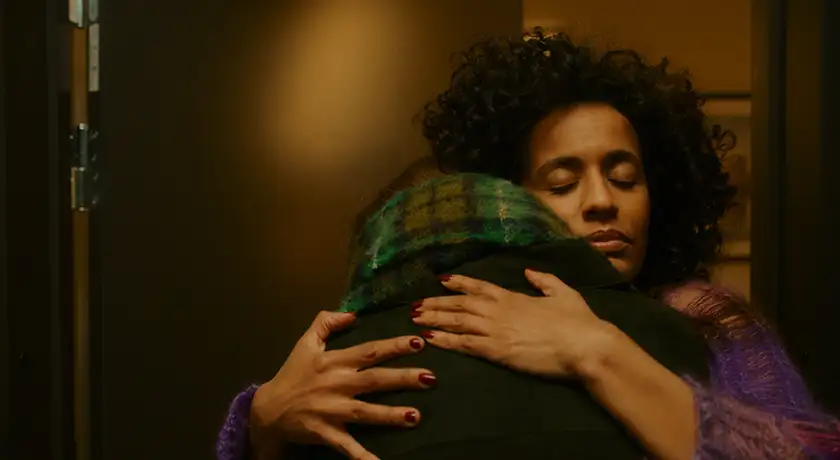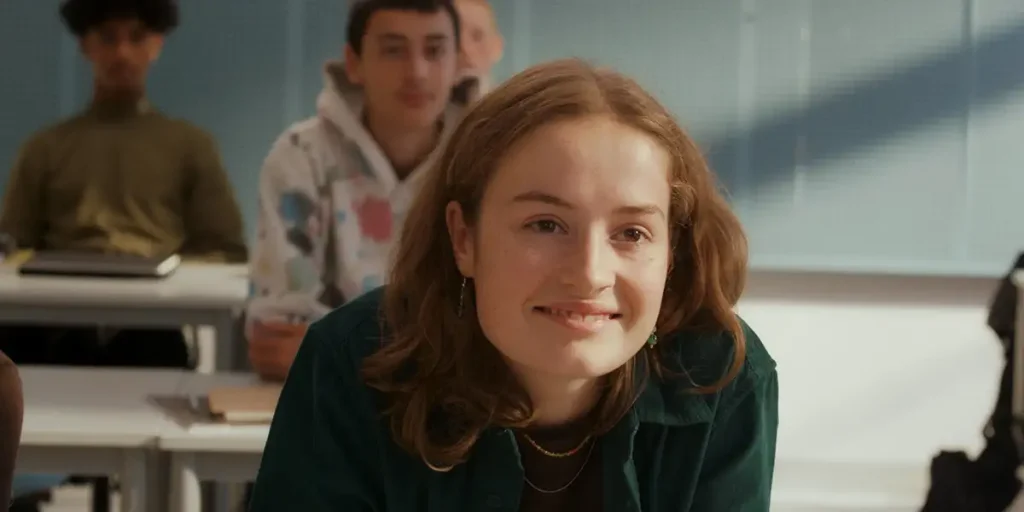Hidden beneath the mystery of a student-teacher relationship in Dag Johan Haugerud’s Dreams (Drømmer) is the unfocused but empathetic tale of a girl trying to “figure herself out”.
Writer & Director: Dag Johan Haugerud
Genre: Drama, Coming of Age
Run Time: 110′
Berlin Film Festival Screening: February 19, 2025
Norway Release Date: October 4, 2024
U.S. & U.K. Release Date: TBA
“Is it true?,” seventeen-year old Johanne’s (Ella Øverbye) mother asks her daughter halfway through Dreams (Drømmer), referring to an intimate, racy manuscript the latter wrote about her meetings with a teacher she has a crush on. “It’s about me,” Johanne responds. “But did it happen?,” her mother asks again, summing up the most interesting topic approached by writer-director Dag Johan Haugerud in his latest movie, the final film in his “Sex, Dreams, Love” trilogy.
Dreams, which will have its International Premiere in competition at the 2025 Berlin Film Festival, doesn’t waste any time introducing us to its teenage protagonist. As soon as the film begins, we’re let into her thoughts by a voiceover that acts like a sort of internal dialogue for Johanne, who’s trying to make sense of her emotions. “My life is in a cloud,” she tells us. “Sometimes I imagine a translucent veil of clouds, and then I worry that there’s nothing there to keep things in place. And that everything I am will fall down into the street and get washed away by the rain.” Johanne is clearly overwhelmed by feelings she’s never had before, and those feelings soon become so intense that they take over her entire life.
It all starts when she reads a novel where a young, lonely protagonist falls in love with a boy, and a sex scene in the book awakens new desires that she doesn’t fully understand – until a new teacher arrives at her school and she starts experiencing those urges herself. Johanne has a crush on her French teacher Johanna (Selome Emnetu), which soon becomes an obsession.
“It’s as if I could feel her presence inside my body,” she says, explaining that every opportunity for interaction in class comes with a rollercoaster of emotions. “I felt like everything would be fine or my entire life would end,” she tells us, and just like that, we’re reminded of our own teenage years, when everything used to come in extremes and even a glance had the potential to be either “the most beautiful thing that’s ever going to happen” or a huge source of shame and self-doubt.
Johanne is in love, but that’s not her only preoccupation. Following in the steps of her author grandma Karin (Anne Marit Jacobsen), our protagonist decides to capture her feelings on paper, though she’s not quite sure why. “Why must we talk about, photograph or write about our experience? Isn’t it enough to just keep it with you as a memory?,” she asks herself as she comes to the puzzling realization that, even though she’s ashamed of her feelings, she also needs her family to know. And so, she gives her “nan” a copy of her most prized possession: a 94-pages book that she wrote, which will soon find its way to her mom too, sparking different reactions in both women.

As her mom (Kristin, played to perfection by Ane Dahl Torp) starts reading the book, Johanne remembers her moments with Johanna, some of which took place at the latter’s apartment, and we get to see glimpses of what happened. But is what we’re seeing an actual memory or does it all come from Johanne’s imagination? And does it even matter in the end?
At first, it comes natural to us to ask ourselves those very same questions Kristin and Karin – the two generations of women in her family – can’t stop thinking about. Since their daughter and granddaughter’s writings are so vivid, it must have all taken place in real life, in which case she might be victim of assault or, at the very least, manipulation. But then again, she’s a great writer and very mature for her age, so it could also just be very convincing fiction.
Dreams is at its best when it focuses on Johanne’s inner life. Just like he did in the previous films in the trilogy, Haugerud treats his characters with no judgement, and it soon becomes clear that the director doesn’t want us to find out the truth, but to understand Johanne. From the very first scene till the last, we never stop looking at its protagonist with compassion, because as unique as her situation is, the feelings she experiences are universal. Even the alleged “affair” isn’t as important as Johanne itself, as what Drømmer is really about is a young girl who hasn’t quite discovered who she is yet.
In the first half of the film, I was utterly enthralled by this story, recognizing Haugerud’s “magic” in every quotable, meaningful line of dialogue – from Johanne’s conversations with her mom and grandma to clever insight about queerness and identity – and completely immersed in Johanne’s world. Sadly, the second half of the movie lost me, because Dreams soon becomes less about Johanne and more about a series of side topics that are only approached superficially.
At some point in the movie, a friend of Johanna’s named Frøydis (Ingrid Giæver) is introduced that serves a specific purpose in that scene alone, and then returns later on, in another strategically placed moment that ties things up a little too neatly, driving us further away from Johanne. Frøydis’s presence in the movie is hard to justify, even more so when the movie seems to suggest that it’s not unusual for Johanna to invite a string of students to her place, bringing a thriller-like element to the narrative that is never explored again.
This becomes even more of an issue when, not long after that scene, a conversation takes place between Johanna and Johanne’s mum where the former suggests that she’s the one who felt “abused” by her student. Even though the subject is introduced with the same non-judgemental lens that defines the entirety of Haugerud’s work, it still feels like this specific aspect should have either been approached properly or not approached at all, particularly in an exchange that starts out as a lighthearted and even ironic chat.
This is a film about a potential affair between a teacher and an underage student, though it is never revealed if the relationship at its core is real or fictional, because that’s not the point of the film. Still, there’s at least a possibility that Johanna didn’t make it up, and that grooming was involved. This makes Johanna a potential groomer, and the fact that she casually mentions that she felt “abused” by a teenager – and that this specific topic is never brought up again in the film – is (unintentionally) a little problematic, even if the scene as a whole is meant to be interpreted in an ironic way.
Another awkward moment takes place toward the end, when a psychologist is introduced whose aim seems to be that of letting us know that Johanne feels lost – something that both Johanne and the movie itself have spent its entire runtime reiterating – in a tonally bizarre exchange that feels out of place in an otherwise subtly poetic film. Not long after that, Johanne’s voiceover returns to convey the film’s message once again, almost as if Haugerud was worried that his viewers wouldn’t understand it on their own.
It’s such a shame to see a movie whose first half is so well-paced and empathetic end up feeling so unfocused by the end, particularly from a writer-director who’s usually so good at juggling many themes to deliver a coherent whole. Here, there are some fascinating side topics, like the purpose of creative arts and Johanne’s mom and grandma reminiscing about their own adolescence. Yet the film, as a whole, feels like a missed opportunity to really delve into the themes that make its first half work so well.
The positives still outweigh the negatives in Dreams, a film that’s definitely weaker than the previous movie in the trilogy and that could have tackled its controversial topic in a more interesting way but that still has moments that will affect you and make you think, delivered with the usual charm, irony, and astonishing emotional impact that we’ve come to expect from a Dag Johan Haugerud movie.
When Drømmer focuses on Johanne’s search for her own truth, the film really does work, and those moments of authenticity make the whole movie worthwhile, also thanks to fantastic acting from all four leads, skilled camerawork, and an empathetic look at the loneliness of adolescence and the experiences that shape us. “Not everything in books is true,” a friend of Johanne’s tells her at the beginning of the film. “Sure, but that’s not why I read,” she responds. “I read to look for the truth; to have a place to go. And to arrive at myself.”
Dreams (Drømmer): Movie Plot & Recap
Synopsis:
19-years-old Johanne’s crush on her French teacher bring up feelings she’s never had before, and to make sense of it all, she writes it all down. When she shares her intimate manuscript with her mom and grandma, the women in her family wonder if it all took place or if it’s just a fantasy. Meanwhile, Johanne tries to figure out who she is.
Pros:
- An empathetic analysis of adolescence, growing up, and the experiences that make us who we are
- It asks thought-provoking questions about the nature of memory and truth
- Fantastic acting from everyone, Ane Dahl Torp in particular
- The first half of the movie is very strong and subtly poetic, containing many quotable lines and standout moments
Cons:
- The second half of the film is very unfocused
- Tries to explore too many themes, some of which very superficially, and the ending ties things up too neatly
- The characters often explicitly convey the film’s message, which wasn’t needed, as it’s already clear by their behavior
- Not all of the characters serve the narrative
Dreams (Drømmer) premiered at the Berlin Film Festival on February 19, 2025. Read our Berlin Film Festival reviews!

